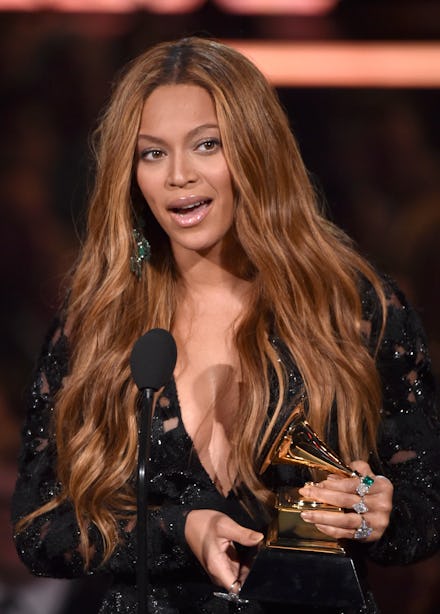The Side to the Beyoncé Snub Everyone Should Actually Be Talking About

On Sunday night, the Grammy Awards delivered one of the biggest snubs of all time: They failed to recognize Beyoncé's paradigm-shifting self-titled record.
Beyoncé's self-titled visual album, undoubtedly an industry tour de force, was all but a shoo-in for album of the year. But it lost spectacularly. Instead, the Recording Academy's voters opted for Beck's Morning Phase, replicating an emerging pattern that's made the coveted prize more of a lifetime achievement award for staid mainstream tastes than a barometer of what matters now in music.
It also served as a painful reminder that the mainstream of American music is still undeniably white. If there were ever a reason why awards shows expressly celebrating the black community's creativity are necessary, Beyoncé's snub proves it.
This is a persistent problem. Mainstream awards shows like the Grammy's are alienating artists of color more than ever.
Aside from Beyoncé and Pharrell Williams' nominations for album of the year, music that was pioneered by black creativity appeared in the big four categories thanks to two white artists: Sam Smith and Iggy Azalea. Despite the success of songs such as "Drunk in Love," "Partition" and even "Happy," these hits got shut out from nominations for song of the year and record of the year.
What's more, not a single award from the rap categories was handed out during the live telecast; instead they were relegated to the pre-awards event attended by industry insiders. Even then, rap music had little representation during Sunday's event. Kendrick Lamar, who went home empty-handed last year because voters preferred Macklemore, took home two prizes from the rap categories, but you wouldn't know it from watching the three-hour ceremony.
Instead, best R&B performance was the only televised award from historically black genres. It would end up as Beyoncé's only moment onstage with a golden trophy that night.
But there is a solution: black awards shows.
Many see the Grammy Awards as the ultimate source of recognition for musicians. But it isn't the only awards show worth paying attention to, and this year's Grammys were a strong reminder of why we need to pay attention to black award shows more than ever. When it comes to the black community, there are plenty of alternatives, such as the BET Awards, the Soul Train Awards and the NAACP Image Awards. Given the difficulties for black entertainers in mainstream awards shows, we still need awards shows catering to the black community to remain relevant.
That's always been the role of those events. The situation has clearly progressed over time, but the entertainment industry's longstanding diversity struggles created voids that other awards shows sought to fill. For context, the NAACP Image Awards began in the late 1960s after the organization saw a need to explicitly recognize entertainers of color, including African-Americans, for their contributions to the arts. The Grammys generally have a better track record than, say, the Oscars. But programs like the Image Awards and the BET Awards allow the black community to celebrate and showcase its creativity without pandering to broader industry politics and mainstream sensibilities. In short, they allow artists in the black community to be truly expressive and to be recognized on the strength of their art.
Indeed, Beyoncé is just one artist, and one who's been acknowledged plenty of times by awarding organizations such as the Recording Academy. For every Beyoncé snub, there are countless other black artists who won't ever have a Grammy moment. The industry's racialized politics could be part of the problem — but the black community's other awards shows are ultimately part of the solution. And they deserve as much attention as we can give them.